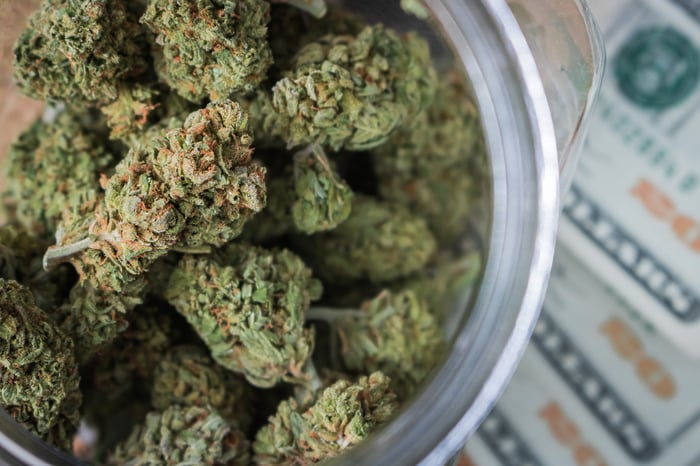The green rush is really coming into focus, with marijuana stocks beginning to report their first (partial) quarters of operating results following the legalization of recreational pot in Canada on Oct. 17. In this industry with multibillion-dollar potential, Wall Street and investors are curious where this revenue will wind up.
One of the country's top producers, New Brunswick-based OrganiGram Holdings (OGI -2.85%), provided one piece to this big puzzle before the opening bell on Monday, Jan. 28, by reporting its fiscal first-quarter operating results. Thanks to strong demand in the post-legalization environment, sales more than quintupled and free cash flow turned "green" for the first time in the company's history.

Image source: Getty Images.
OrganiGram Holdings Q1 results: The raw numbers
| Metric | Q1 2019 | Q1 2018 | % Change |
|---|---|---|---|
| Net sales | CA$12.44 million | CA$2.4 million | 419% |
| Net income | CA$29.48 million | (CA$1.4 million) | N/A |
| Earnings per share | CA$0.195 | (CA$0.012) | N/A |
Data source: OrganiGram Holdings. All data expressed in Canadian dollars.
There's no mistaking the impact recreational legalization had on OrganiGram's results, even if it encompassed only half of the company's quarter, which ended Nov. 30. Net sales, which excludes excise taxes, more than quintupled to $12.44 million in Canadian dollars, with gross margin expanding to 71%. Comparatively, expenses rose by a lesser 112% year over year.
However, it's also important to recognize the role that fair-value adjustments to biological assets (i.e., cannabis plants) played in the company's bottom line. Despite producing robust net income of CA$29.48 million, this was aided by a positive fair-value adjustment above the line of CA$42.93 million. Nevertheless, OrganiGram delivered its first-ever quarter of positive free cash flow: CA$2.9 million.
What happened with OrganiGram Holdings this quarter?
Capacity expansion and product diversification characterized the company's fiscal first quarter. Here's a quick glimpse of the company's highlights in Q1 2019.
- OrganiGram continued its three-stage phase-four expansion at Moncton, New Brunswick, with the budget for the project rising to a range of CA$120 million to CA$125 million from CA$110 million, because of higher steel costs and the timing of winter construction. Completion, however, remains on track, with phases 4A and 4B expected to be finished in April and August, and the final phase completed in the fall. Once complete, OrganiGram will have 113,000 kilograms of targeted annual yield.
- The company continued to work with Quebec to become an official supplier. Currently, Quebec is the only Canadian province OrganiGram doesn't have a supply agreement with.
- OrganiGram completed an investment in Eviana Health during the fiscal first quarter and entered into an agreement with 1812 Hemp subsequent to the end of Q1 2019. Both deals diversify the company's product portfolio, with OrganiGram able to purchase up to 25% of Eviana's annual cannabidiol (CBD) production, and the company gaining access to 6,000 kilograms of dried hemp flower harvested by 1812 Hemp. Hemp is rich in CBD, the non-psychoactive cannabinoid best known for its medical benefits.

Image source: Getty Images.
What management had to say
As you might imagine, CEO Greg Engel was exceptionally upbeat following sales that topped anything OrganiGram had previously produced in a full year:
The first quarter of 2019 is just the start of what we expect to be a year of tremendous growth. We've always believed the Moncton Campus would be a competitive advantage for us being able to produce high-quality indoor-grown product at low cash cost of cultivation. Our first quarter results confirmed that as we reported an adjusted gross margin of 71%.
While we continue to work hard to take advantage of our enviable inventory build to drive increased sales, we are already well under way preparing for the derivative and edibles launch during the fall of 2019.
Looking forward
So what's next for this Atlantic-based top-tier grower? As you just read, the company continues to focus on product differentiation. We've seen what's happened in U.S. states such as Colorado, Washington, and Oregon, where rampant oversupply of dried cannabis has wrecked operating margins. Pivoting to other higher-margin products, including oils, edibles, topicals, and other consumption options, should help protect long-term operating margins. Health Canada has suggested that alternative consumption options, such as edibles, should be legalized by October.
OrganiGram also expects that adult-use weed demand, along with an increasing amount of output and a full quarter of post-legalization sales, will yield to a doubling in revenue in the sequential second quarter from the first quarter, or about CA$25 million.
For the time being, it's all systems "grow."
Check out all our earnings call transcripts.





